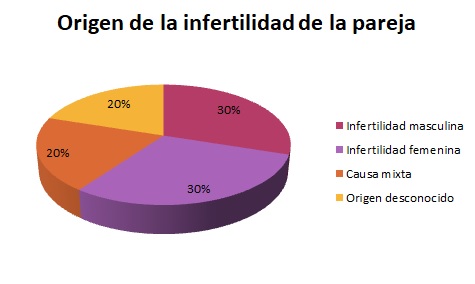Currently in our country, the infertility rate amounts to about 17% of the population, which means about 800,000 couples who have fertility problems, and this number continues to increase. In addition, it is estimated that there are more than 48 million infertile couples worldwide. It could be said that the problem of infertility affects approximately 1 in 6 couples.
This increase in infertility in the population is due, among other things, to the delay in the age at which the first child is born and to certain environmental factors, such as tobacco consumption, overweight and environmental pollution. Broadly speaking, 30% of infertility cases are caused by
male problems
another 30% are due to
female problems
and the remaining 40% are due to mixed or unknown causes.
For this reason, the use of assisted reproduction techniques is increasing in our society. Thus, according to the latest data known by the Spanish Fertility Society (SEF), in 2014 they amounted to more than 100,000 treatment cycles performed in our country. Thanks to these treatments, more than 25,000 children are born every year in Spain through assisted reproduction; worldwide, more than seven million babies have been born through these techniques. Spain is the European country with the highest number of in vitro fertilization cycles performed, according to the latest study.
Naturally, it is considered that there is a 25% chance of pregnancy with sexual intercourse at the time of ovulation of the woman. However, after the age of 35 this possibility decreases, as does the reproductive potential, so that after the age of 40 the possibility of pregnancy per month is usually less than 10%. In most cases, by resorting to a specialized assisted reproduction center, the desired pregnancy and the birth of a healthy baby will be achieved.
It should be noted that the treatment with the highest success rate, with approximately 60%, for achieving pregnancy is ovodonation, that is, in vitro fertilization using donor eggs. In contrast, the technique with the lowest success rate would be the simplest, i.e., intrauterine insemination.
intrauterine insemination
which consists of introducing the semen directly into the uterus after processing in the laboratory, with a success rate of approximately 15%.
For our part, the most commonly performed techniques in our center are ovodonation and IVF/ICSI, i.e. cycles in which a combination of in vitro fertilization and in vitro fertilization are performed.
in vitro fertilization
and
sperm microinjection
to improve the chances of pregnancy. In addition, our success rates using preimplantation genetic diagnosis (PGD) are among the highest, while our miscarriage rate is among the lowest at present.
Phi Fertility
C. Orjuela, Embryologist
Contact our fertility clinic.
Vithas Perpetuo Internacional. Plaza del Doctor Gómez Ulla 15, in Alicante.
Phone: 965230397 / +34 606437458
Email: info@phifertlity.com
You can keep informed of our publications and news through our social networks Facebook and Twitter.





